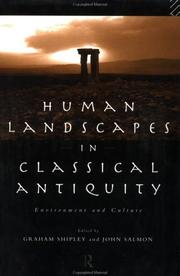| Listing 1 - 3 of 3 |
Sort by
|
Book
ISBN: 9782251030227 2251030220 Year: 2014 Volume: 22 Publisher: Paris Belles lettres
Abstract | Keywords | Export | Availability | Bookmark
 Loading...
Loading...Choose an application
- Reference Manager
- EndNote
- RefWorks (Direct export to RefWorks)
History of ancient Greece --- Roman history --- Ecology --- Human ecology --- Ecologie --- Ecologie humaine --- History --- History. --- Histoire --- Littérature antique --- Écologie humaine --- Environnement --- Anthologies --- Protection --- Anthologies. --- Ecology - Greece - History --- Ecology - Rome - History --- Human ecology - Greece - History --- Human ecology - Rome - History

ISBN: 1134841655 1280157518 0203426908 0203298322 9780203298329 9780203426906 9780415107556 0415107555 9786610157518 6610157510 9781134841653 9781280157516 9780415692472 0415692474 9781134841608 9781134841646 1134841647 Year: 1996 Publisher: Abingdon, Oxon New York
Abstract | Keywords | Export | Availability | Bookmark
 Loading...
Loading...Choose an application
- Reference Manager
- EndNote
- RefWorks (Direct export to RefWorks)
Human Landscapes in Classical Antiquity shows how today's environmental and ecological concerns can help illuminate our study of the ancient world. The contributors consider how the Greeks and Romans perceived their natural world, and how their perceptions affected society. The effects of human settlement and cultivation on the landscape are considered, as well as the representation of landscape in Attic drama. Various aspects of farming, such as the use of terraces and the significance of olive growing are examined.
Ecology --- Human ecology --- Landscapes --- Countryside --- Landscape --- Natural scenery --- Scenery --- Scenic landscapes --- Nature --- Environment, Human --- Human beings --- Human environment --- Ecological engineering --- Human geography --- Balance of nature --- Biology --- Bionomics --- Ecological processes --- Ecological science --- Ecological sciences --- Environment --- Environmental biology --- Oecology --- Environmental sciences --- Population biology --- History. --- Social aspects --- Effect of environment on --- Effect of human beings on --- Greece --- Rome --- Civilization. --- Ecology - Greece - History. --- Ecology - Rome - History. --- Human ecology - Greece - History. --- Human ecology - Rome - History. --- Landscape - Greece - History. --- Landscape - Rome - History.
Book
ISBN: 9780521174657 9781107002166 1107002168 0521174651 9780511843761 1139334123 1107226708 1139337491 9786613571458 113933994X 1139341529 1139338366 0511843763 1139336622 128039353X 9781139338363 9781139336628 9781280393532 9781139339940 9781107226708 9781139334129 6613571458 9781139337496 9781139341523 Year: 2012 Publisher: Cambridge Cambridge University Press
Abstract | Keywords | Export | Availability | Bookmark
 Loading...
Loading...Choose an application
- Reference Manager
- EndNote
- RefWorks (Direct export to RefWorks)
In ancient Greece and Rome an ambiguous relationship developed between man and nature, and this decisively determined the manner in which they treated the environment. On the one hand, nature was conceived as a space characterized and inhabited by divine powers, which deserved appropriate respect. On the other, a rationalist view emerged, according to which humans were to subdue nature using their technologies and to dispose of its resources. This book systematically describes the ways in which the Greeks and Romans intervened in the environment and thus traces the history of the tension between the exploitation of resources and the protection of nature, from early Greece to the period of late antiquity. At the same time it analyses the comprehensive opening up of the Mediterranean and the northern frontier regions, both for settlement and for economic activity. The book's level and approach make it highly accessible to students and non-specialists.
Human ecology --- History --- Greece --- Rome --- Environmental conditions --- History. --- Environmental conditions. --- Ecologie humaine --- Histoire --- Grèce --- Conditions environnementales --- Arts and Humanities --- Ecology --- Environment, Human --- Human beings --- Human environment --- Ecological engineering --- Human geography --- Nature --- Social aspects --- Effect of environment on --- Effect of human beings on --- Rim --- Roman Empire --- Roman Republic (510-30 B.C.) --- Romi (Empire) --- Byzantine Empire --- Rome (Italy) --- al-Yūnān --- Ancient Greece --- Ellada --- Ellas --- Ellēnikē Dēmokratia --- Elliniki Dimokratia --- Grčija --- Grecia --- Gret︠s︡ii︠a︡ --- Griechenland --- Hellada --- Hellas --- Hellenic Republic --- Hellēnikē Dēmokratia --- Kingdom of Greece --- République hellénique --- Royaume de Grèce --- Vasileion tēs Hellados --- Xila --- Yaṿan --- Yūnān --- Ελληνική Δημοκρατία --- Ελλάς --- Ελλάδα --- Греция --- اليونان --- يونان --- 希腊 --- Human ecology - Greece - History - To 1500 --- Human ecology - Rome - History --- Greece - History - 146 BC-323 AD --- Rome - History - Republic, 265-30 B.C --- Rome - History - Empire, 30 BC-284 AD --- Greece - Environmental conditions --- Rome - Environmental conditions
| Listing 1 - 3 of 3 |
Sort by
|

 Search
Search Feedback
Feedback About UniCat
About UniCat  Help
Help News
News